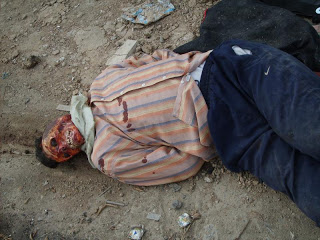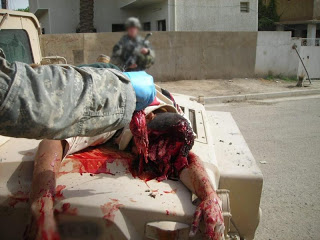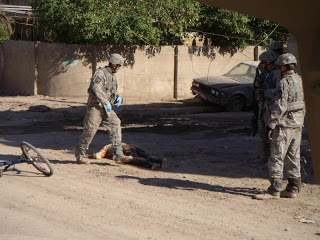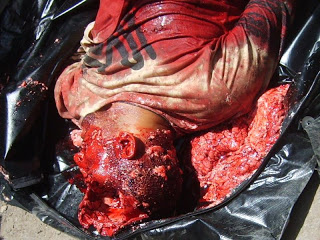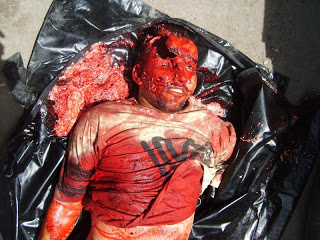Iraq – A Country Torn Apart
It is sometime that I have posted anything on Iraq. This is a war that has slipped out of our consciousness, yet it should be burnt into our memories. Over 1 million people died as a result of the US/British invasion of that country. A civil war was deliberately instigated in line with the old imperial ‘divide and rule’ tactic. It was an invasion which posted troops outside the Ministry of Oil yet left the museums of Iraq, with their priceless exhibits to be plundered at random. It was an invasion which parked its tanks on the remains one of the seven wonders of the world, the Hanging Gardens of Babylon. With the invasion of Iraq came Abu Ghraib, waterboarding and the legitimation of torture. We are often told, in relation to Israel/Palestine that but for the ‘Jewish lobby’ the US would behave differently and follow its own interests instead of that of the Zionists. Iraq is a demonstration of just what those interests involve. The idea that the USA is at all interested in the human rights of the Palestinians is part of this nonsense. Whereas even British imperialism in its day left some cultural legacy in terms of economic and educational achievements (and of course many horrors, famines and brutalities) the USA is alone in leaving nothing other than evidence of its own barbarism. The photographs below are gruesome by any definition. The testimony is even more so as we see how Arab life was cheap to the United States. That the USA leaves Iraq defeated nonetheless is tribute to the resistance put up. It is unfortunate that that resistance was unable to overcome its own sectarian divisions and present a political challenge to the occupiers. This is why Iraq has ended up with the government of Maliki. Tony Greenstein
By David Swanson
December 19, 2011 War Is A Crime
Every American should read this letter: December 18, 2007
To: Mr. Randy Waddle, Assistant Inspector General, Ft Carson, Colorado
CC: LTC John Shawkins, Inspector General, Ft Carson, Colorado
Major General Mark Graham, Commanding Officer, Ft Carson, Colorado
Major Haytham Faraj, USMC, Camp Pendleton, California
Lt General Stanley Greene, US Army Inspector General
Subject: Formal Notification of War Atrocities and Crimes Committed by Personnel, B Company, 2-12, 2nd Brigade Combat Team, 2nd Infantry Division in Iraq Dear Mr. Waddle, My name is John Needham. I am a member of Bravo Company, 2nd Battalion, 2nd Infantry division, 2nd Brigade Combat Team, 2nd Infantry Division, (BCo,2-12INF,2BCT,2ID . I deployed with my unit to Iraq from October 2006 until October 2007 when I was medically evacuated for physical and mental injuries that I suffered during my deployment. The purpose of my letter is to report what I believe to be war crimes and violation of the laws of armed conflict that I personally witnesses while deployed in Iraq. Upon arriving in Iraq in October of 2006 my unit was assigned to the ¼ Cavalry unit at Camp Prosperity. In March of 2007 I was sent back to my unit, B Company 2-12 at Camp Falcon. It was at Camp Falcon that I observed and was forced to participate in ugly and inhumane acts against the Iraqi citizens in our area of responsibilities. Below I list some of the incidents that took place. In March of 2007, I witnessed SSG Platt shoot and wound an Iraqi national without cause of provocation. The Staff Sergeant said that he suspected the Iraqi be a “trigger” man. We had not been attacked and we found no evidence on the man to support the suspicion. As the Iraqi lay bleeding on the ground, PVT Smith requested to administer first aid to the Iraqi. SSgt Platt said no and “let him bleed out.” When SSG Platt walked away, Pvt Smith and PVT Mullins went to the Iraqi, dragged him to an alley, and applied first aid. They then drove him to the cache for further treatment. In June of 2007 1SG Spry caused an Iraqi male to be stopped, questioned, detained, and killed. We had no evidence that the Iraqi was an insurgent or terrorist. In any event when we stopped he did not pose a threat. Although I did not personally witness the killing, I did observe 1sg Spry dismembering the body and parading of it while it was tied to the hood of a Humvee around the Muhalla neighborhood while the interpreter blared out warnings in Arabic over the loud speaker. I have a photo that shows 1SG Spry removing the victim’s brains. On another occasion an Iraqi male was stopped by a team led by Sgt Rogers as he walked down an alleyway. The Iraqi was detained and questioned then with his hands tied behind his back, SGT Rogers skinned his face. 1ST Spry shot a young Iraqi teenager who was about 16 years old. The shooting was unprovoked and the Iraqi posed no threat to the unit. He was merely riding his bicycle past an ambush site. When I arrived on the scene I observed 1SGT Spry along with SSG Platt dismember the boy’s body. In August of 2007, I responded to radio call from SGT Rogers reporting that he had just shot an Iraqi who was trying to enter through a hole that the platoon had blown in a wall to allow them observation of the area during a security patrol. When I arrived, I saw a one armed man who was still alive lying on a barricade. The man was about 30 years old. He had an old Ruger pistol hanging from his thumb. It was obvious to me that the pistol was placed there because of the way it hung from his thumb. The Iraqi was still alive when I arrived. I saw SGT Rogers shoot him twice in the back with hollow point bullets. The Iraqi was still moving. I was asking why they shot him again when I heard Sgt Hoskins say “he’s moving, he’s still alive.” SPEC Hoskins then moved to the Iraqi and shot him in the back of the head. SSG Platt and SGT Rogers were visibly excited about the kill. I saw them pull the Iraqi’s
brains out as they placed him in the body bag. CPT Kirsey must have learned something about this incident because he was very upset and admonished the NCOs involved. I have seen and heard 1SGT Spry brag about killing dogs. He kept a running count. At last count I remember he was boasting of having killed 80 dogs. On many occasions I observed SGT Temples, SSG Platt and SGT Rogers beat and abuse Iraqi teenagers, some as young as 14, without cause. They would walk into a house near areas where they suspected we had received sniper fire, then detain and beat the kids. I have photos that support my allegations. I also have numerous other photos on a laptop PC that the unit illegally seized from me. I have requested its return but they have refused. My experiences have taken a terrible toll on me. I suffer from PTSD and depression. I had no way to stop the ugly actions of my unit. When I refused to participate they began to abuse and harass me. I am still in treatment at the Balboa Naval hospital. I respectfully request that you investigate these matters, that you protect my safety by reassigning me to a different unit that is not located at Fort Carson, that you return my PC or, at least, seize it to protect the evidence on it, and that you issue a military protective order to prohibit the offending members of my unit from harassing, retaliating, or contacting me. I have some photographs and some supporting documentation to these allegations. Respectfully,
PFC John Needham
US Army
And every American should view these photographs (warning, extremely revolting). And then watch this superb video to learn from John Needham’s father what became of him: On the Dark Side in Al Doura – A Soldier in the Shadows from Pulse TV & Maverick Media on Vimeo. WARNING: Graphic and disturbing photos between 38:47 and 40:00. VIDEO DESCRIPTION: U.S. Army Ranger John Needham, who was awarded two purple hearts and three medals for heroism, wrote to military authorities in 2007 reporting war crimes that he witnessed being committed by his own command and fellow soldiers in Al Doura, Iraq. His charges were supported by atrocity photos which, in the public interest, are now released in this video. John paid a terrible price for his opposition to these acts. His story is tragic.
CBS reported obtaining an Army document from the Criminal Investigation Command suggestive of an investigation into these war crimes allegations. The Army’s conclusion was that the “offense of War Crimes did not occur.” However, CBS also stated that the report was “redacted and incomplete; 111 pages were withheld.” Salon covered this story too: Thanks to Cindy Piester for the excellent video and all of this information. Update – Casualties of War Pfc. John Needham, son and grandson of military men, joined the U.S. Army in 2006 with “the whole goal of giving your life for somebody else” ‘his comrades’ and in Iraq he was awarded the Purple Heart. But he suffered depression and excruciating back pain, crippling post-traumatic stress disorder and addiction to various drugs and vodka. Before enlisting, he had never touched a drink. In 2008 he considered suicide; and in a fight with his drug-addicted former girlfriend, he battered her with his fists. She died in the hospital. He remembered nothing. Private Needham had fallen apart, he said, because he had witnessed “war crimes”; and when he reported them, his comrades mocked him. According to his letter in 2007 to Army officials, members of his company shot Iraqis without provocation. A sergeant killed one, removed the man’s brain, strapped the corpse to the humvee hood and paraded it through town blaring warnings in Arabic. An investigation found no crimes. In February 2010, John Needham died of a drug overdose after three operations on his back. Salon.com and CBS’s “48 Hour Mystery” have told his story. His father, a Vietnam veteran, will tell it again this month when he reads the text of his son’s “war crimes” letter at a Human Rights Day observance in Los Angeles. The father says the Army failed his son. He is right. John and his girlfriend are both casualties of these wars. Hundreds of unknown John Needhams are coming home. This nation owes them a more supportive welcome On the Dark Side in Al Doura – A Soldier in the Shadows from Pulse TV & Maverick Media on Vimeo. The US is Blind to the Price of War That is Still Being Borne by the Iraqi People Every effort must be made to thwart those who seek to embellish and distort America’s lamentable legacy in Iraq By Gary Younge
December 19, 2011 “The Guardian” — On 19 November 2005 a US marine squad was struck by a roadside bomb in Haditha, in Iraq’s Anbar province, killing one soldier and seriously injuring two others. According to civilians they then went on the rampage, slaughtering 24 people. They included a 76-year-old man in a wheelchair and a three-year-old child. It was a massacre. “I think they were just blinded by hate … and they just lost control,” said James Crossan, one of the injured marines. When he heard the news, Major General Steve Johnson, the American commander in Anbar province at the time, saw no cause for further examination. “It happened all the time … throughout the whole country. So you know, maybe, if I was sitting here [in Virginia] and heard that 15 civilians were killed I would have been surprised and shocked and done more to look into it. But at that point in time I felt that it was just a cost of doing business on that particular engagement.” Eight soldiers were originally charged with the atrocity. Charges against six were dropped, one was acquitted and the other is awaiting trial. We know this because a New York Times reporter found documents from the US military’s internal investigation in a rubbish dump near Baghdad. An attendant was using them to make a fire to cook smoked carp for dinner. The article ran on the same day that Barack Obama announced the withdrawal of American troops last week, hailing the almost nine-year war a “success”, resulting in “an extraordinary achievement” that the troops can look on “with their heads held high”. And so it is that America moves on, casting evidence of its war crimes in the trash, holding nobody accountable and choosing to understand defeat as victory and failure as success. While the departure of American troops should be greeted with guarded relief (guarded because the US will maintain its largest embassy in the world there along with thousands of armed private contractors), every effort must be made to thwart those who seek to embellish and distort their lamentable legacy. You’d think that would be easy. The case against this war has been prosecuted extensively both in this column and elsewhere. (The argument that the removal of Saddam Hussein somehow compensates for the lies, torture, displacement, carnage, instability and humans rights abuses is perverse. They used a daisy cutter to crack a walnut.) This war started out with many parents but has ended its days an orphan, tarnishing the reputations of those who launched it and the useful idiots who gave them intellectual cover. Nobody has been held accountable; few accept responsibility. In any case, they could not have done it alone. It was only possible thanks to the systemic collusion of a supine political class and a jingoistic political culture, not to mention a blank cheque from the British government. When the war started, almost three-quarters of Americans supported it. Only politicians of principle opposed it – and there were precious few of those. When Nancy Pelosi was asked why she had not pushed for impeachment of Bush when she became speaker in 2006 she said: “What about these other people who voted for that war with no evidence … Where are these Democrats going to be? Are they going to be voting for us to impeach a president who took us to war on information that they had also?” Today, withdrawing the troops is about the only truly popular thing Obama has done in the last two years. Polls show more than 70% support withdrawal, roughly two-thirds oppose the war, and more than half believe it was a mistake. But there is a difference between regretting something and learning from it. And while there is ample evidence of the former, there is little to suggest the latter. According to Christopher Gelpi, a political science professor at Duke University who specialises in public attitudes to foreign policy, the most important single factor shaping Americans’ opinions about any war is whether they think America will win. This solipsistic worldview is hardly conducive to the kind of introspection that might translate remorse into redemption. It’s a mindset that understands the war in Vietnam as being wrong not because an independent country was invaded, flattened, millions murdered and thousands tortured. It was wrong because the US lost. And it pervades the political spectrum. Even when the war’s critics slam the blood and treasure squandered, they usually refer only to American lives and American money. This is also the way pollsters frame it. A recent CBS poll asked: “Do you think removing Saddam Hussein from power was worth the loss of American life and other costs of attacking Iraq, or not?” (50% no, 41% yes), and “Do you think the result of the war with Iraq was worth the loss of American lives and other costs of attacking Iraq, or not?” (67% no, 24% yes). The cost to Iraqis simply does not feature. “It is the end for the Americans only,” wrote Emad Risn, argued an Iraqi columnist in a government-funded newspaper. “Nobody knows if the war will end for Iraqis too.” And few Americans seem to care. It’s been some time since Iraq featured at all on the nation’s priorities, let alone high. Rightly Americans fret about the fate of veterans returning to a depressed economy with a range of both physical and mental disabilities. But Iraqi civilians barely get a look-in. According to the New York Times report, among the discarded testimony was an interview with Sergeant Major Edward Sax. “I had marines shoot children in cars, and deal with the marines individually, one on one, about it because they have a hard time dealing with that.” When they told him they didn’t know there were children on board he told them they were not to blame, claiming killing would impose a lifelong burden on them. Progressives, seeking to link the economic collapse to military misadventure, often argue that nation building should begin at home, not in Iraq, thereby – wittingly or not – transforming Iraqis in the public imagination from victims of illegal warfare to recipients of illicit welfare. Without any apparent irony, Obama marked the end of the occupation by calling on others not to meddle in Iraq’s internal affairs. The combined effect of all of this is like breaking someone’s jaw with your fist only to bemoan the excruciating pain that has been visited on your hand. America is not alone in this. Amnesia and indifference are the privileges of the powerful. It is for the Kenyans and Algerians to recall the atrocities committed by the British and French under colonialism while the colonisers remain in flight from their history. “The essential characteristic of a nation is that all its individuals must have many things in common,” wrote the 19th-century French philosopher Ernest Renan, “and must have forgotten many things as well.” No wonder then that a recent Pew poll found that despite all the evidence to the contrary 56% of Americans said they thought the invasion had succeeded in its goals while the number of those who think the invasion was the right decision stands at its highest in five years. The cost of doing business always seems more reasonable when someone else is paying the price
